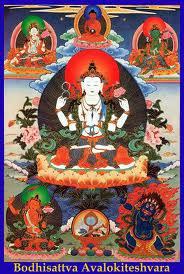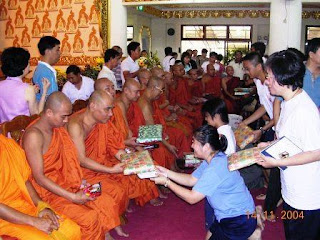The Purpose of Dharma Practice
What is the purpose of the Dharma? Just like other spiritual traditions, Buddhadharma is an instrument for training the mind - something we use to try to work out the problems that we all experience; problems that originated mainly at the mental level. Negative emotional forces create mental unrest, such as unhappiness, fear, doubt, frustration and so forth; these negative mental states can cause us to engage in negative activities, which in turn bring us more problems and more suffering. Practising Dharma is a way of working out these problems, be they long-term or immediate. In other words, Dharma protects us from unwanted suffering.
Buddhadharma means bringing discipline and inner tranquillity into our mind. Therefore, when we talk about transforming our mind and developing inner qualities, the only way we can do this is to utilize the mind itself. There is nothing else we can use to bring about such change.
Thus, we should realize that much of what we do not desire - unwanted events, unhappiness and suffering - actually comes about as a result of our mistaken way of viewing the world and our destructive thoughts and emotions. These negative minds create both immediate unhappiness and future sufferings as well.
Underlying all of this is a fundamental ignorance, a fundamentally flawed way of perceiving reality. In Buddhism, this is called "self-grasping" or "grasping at self-existence". Since this is the case, the way to eliminate negative aspects of mind and the suffering they create is to see through the delusion of these mental processes and cultivate their opponent - the wisdom that is correct insight into the ultimate nature of reality. Through cultivating this insight and applying it as an antidote, we will be able to dispel the suffering and undesirable events in our lives.
To succeed in this, we must first recognize what the negative and positive aspects of mind are and be able to distinguish between them. Once we develop clear understanding of the negative aspects of mind and their destructive potential, the wish to distance ourselves from them will arise naturally within us. Similarly, when we recognize the positive aspects of mind and their potential benefit, we will naturally aspire to gain and enhance these mental qualities. Such transformation of mind cannot be imposed on us from the outside but happens only on the basis of voluntary acceptance and great enthusiasm inspired by a clear awareness of the benefits to be gained.
Time is always moving, minute-by-minute, second-by-second. as time moves on, so do our lives. Nobody can stop this movement. However, one thing is in our hands and that is whether or not we waste the time that we have; whether we use it in a negative way or a constructive way. The passage of time through which we live our lives is the same for all of us and there is also a basic equality between those of us who are a part of this time. The difference lies in our state of mind and motivation.
Proper motivation does not come about simply by our being aware that one kind of motivation is right while another is wrong. Awareness alone does not change motivation. It takes effort. If we carry out this effort wisely, we will attain a positive, desirable result but unwise effort is akin to self-torture. Therefore, we need to know how to act.
This issue of making a wise use of effort is very important. For instance, even external development such as the construction of a building requires a tremendous amount of planning, diligence and care. You need to take into account its exact location, the suitability of the environment, the climate and so forth. Having taken all those factors into account, you can then build a reliable and appropriate structure.
Similarly, when you make an effort in the realm of mental experience, it is important to first have a basic understanding of the nature of mind, thoughts and emotions and also to take into account the complexity of the human physiological condition and how it interfaces with the surrounding environment.
Therefore, it is important for you to have a wide, comprehensive knowledge of things so that you don't exert all your effort blindly pursuing your goal on the basis of a single point. That's not the way of the intelligent, the way of the wise. The way of the wise is to exert effort on the basis of much wider knowledge.
In the Vajrayana Buddhist tradition, there are more than one hundred volumes of Kangyur - sutras attributed to the Buddha himself and more than two hundred volumes of Tengyur - the collection of authoritative commentaries written by such Indian masters as Nagarjuna and Asanga. If you were to distil the meaning of all these sutras and their commentaries and incorporate them into your practice, you would make tremendous strides in terms of realization and spiritual progress, but if you treat all these great literatures simply as an object of veneration and seek instead some smaller text on which to base your practice, then although you receive some benefit, your spiritual progress will not be that great.
Buddhadharma means bringing discipline and inner tranquillity into our mind. Therefore, when we talk about transforming our mind and developing inner qualities, the only way we can do this is to utilize the mind itself. There is nothing else we can use to bring about such change.
Thus, we should realize that much of what we do not desire - unwanted events, unhappiness and suffering - actually comes about as a result of our mistaken way of viewing the world and our destructive thoughts and emotions. These negative minds create both immediate unhappiness and future sufferings as well.
Underlying all of this is a fundamental ignorance, a fundamentally flawed way of perceiving reality. In Buddhism, this is called "self-grasping" or "grasping at self-existence". Since this is the case, the way to eliminate negative aspects of mind and the suffering they create is to see through the delusion of these mental processes and cultivate their opponent - the wisdom that is correct insight into the ultimate nature of reality. Through cultivating this insight and applying it as an antidote, we will be able to dispel the suffering and undesirable events in our lives.
To succeed in this, we must first recognize what the negative and positive aspects of mind are and be able to distinguish between them. Once we develop clear understanding of the negative aspects of mind and their destructive potential, the wish to distance ourselves from them will arise naturally within us. Similarly, when we recognize the positive aspects of mind and their potential benefit, we will naturally aspire to gain and enhance these mental qualities. Such transformation of mind cannot be imposed on us from the outside but happens only on the basis of voluntary acceptance and great enthusiasm inspired by a clear awareness of the benefits to be gained.
Time is always moving, minute-by-minute, second-by-second. as time moves on, so do our lives. Nobody can stop this movement. However, one thing is in our hands and that is whether or not we waste the time that we have; whether we use it in a negative way or a constructive way. The passage of time through which we live our lives is the same for all of us and there is also a basic equality between those of us who are a part of this time. The difference lies in our state of mind and motivation.
Proper motivation does not come about simply by our being aware that one kind of motivation is right while another is wrong. Awareness alone does not change motivation. It takes effort. If we carry out this effort wisely, we will attain a positive, desirable result but unwise effort is akin to self-torture. Therefore, we need to know how to act.
This issue of making a wise use of effort is very important. For instance, even external development such as the construction of a building requires a tremendous amount of planning, diligence and care. You need to take into account its exact location, the suitability of the environment, the climate and so forth. Having taken all those factors into account, you can then build a reliable and appropriate structure.
Similarly, when you make an effort in the realm of mental experience, it is important to first have a basic understanding of the nature of mind, thoughts and emotions and also to take into account the complexity of the human physiological condition and how it interfaces with the surrounding environment.
Therefore, it is important for you to have a wide, comprehensive knowledge of things so that you don't exert all your effort blindly pursuing your goal on the basis of a single point. That's not the way of the intelligent, the way of the wise. The way of the wise is to exert effort on the basis of much wider knowledge.
In the Vajrayana Buddhist tradition, there are more than one hundred volumes of Kangyur - sutras attributed to the Buddha himself and more than two hundred volumes of Tengyur - the collection of authoritative commentaries written by such Indian masters as Nagarjuna and Asanga. If you were to distil the meaning of all these sutras and their commentaries and incorporate them into your practice, you would make tremendous strides in terms of realization and spiritual progress, but if you treat all these great literatures simply as an object of veneration and seek instead some smaller text on which to base your practice, then although you receive some benefit, your spiritual progress will not be that great.




Comments